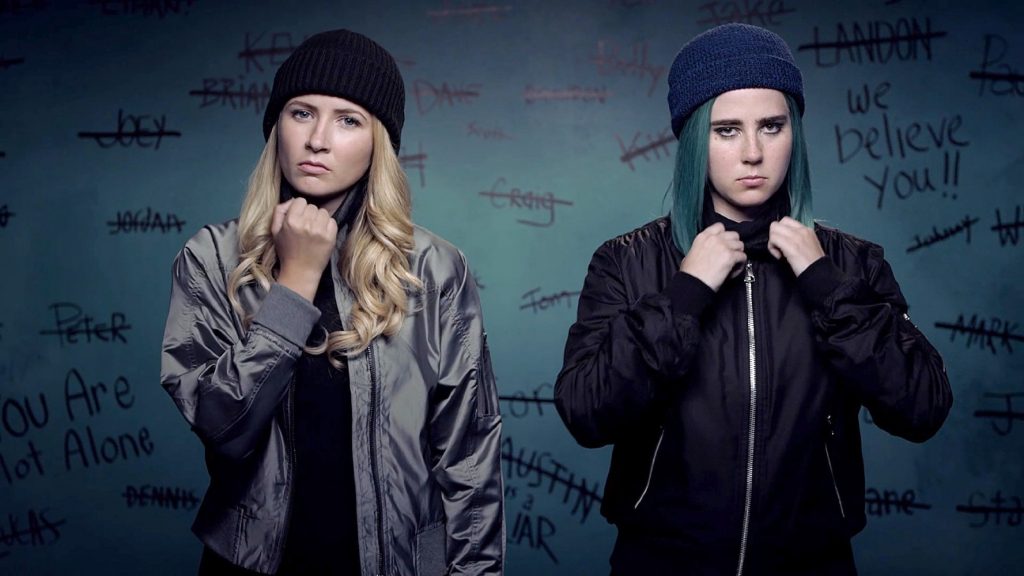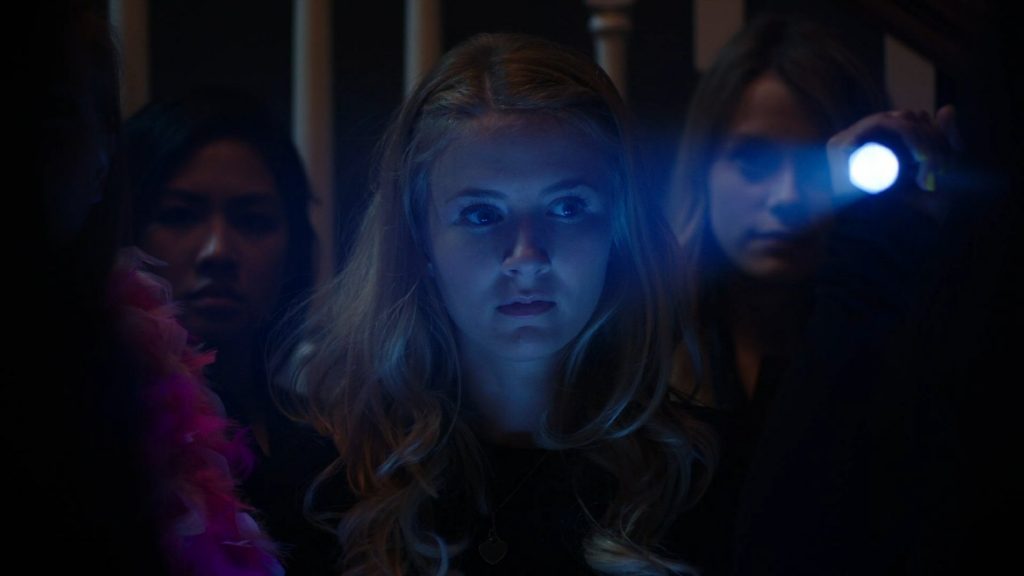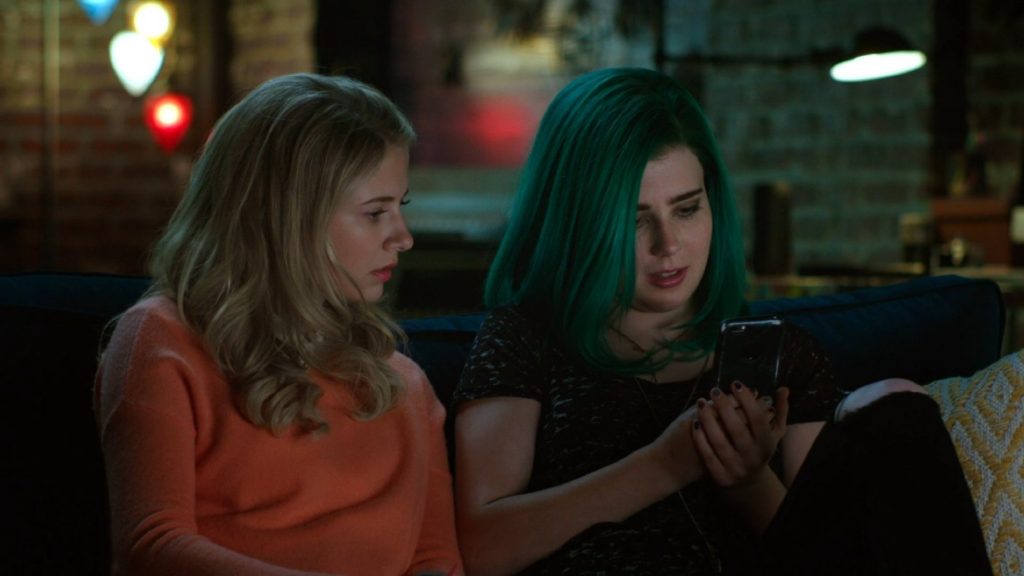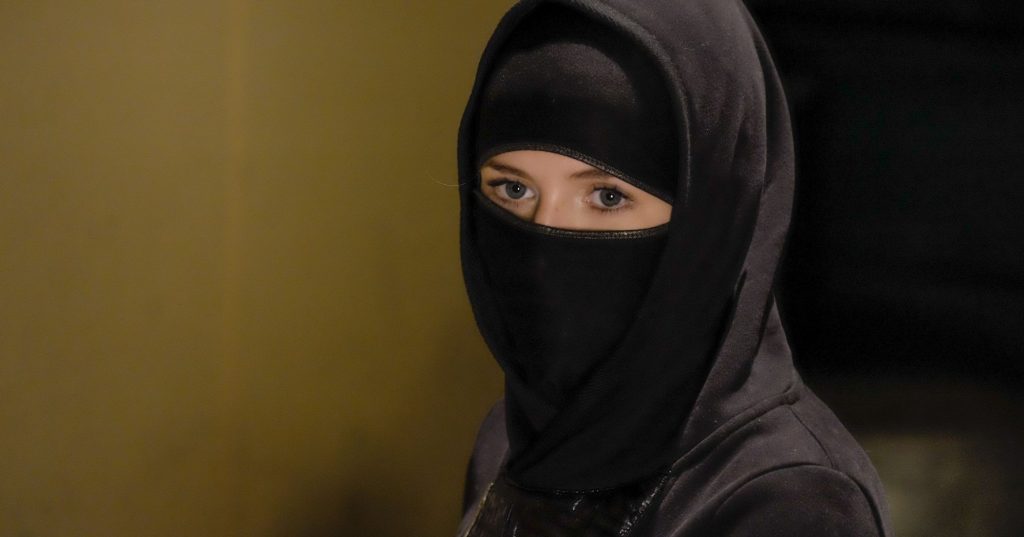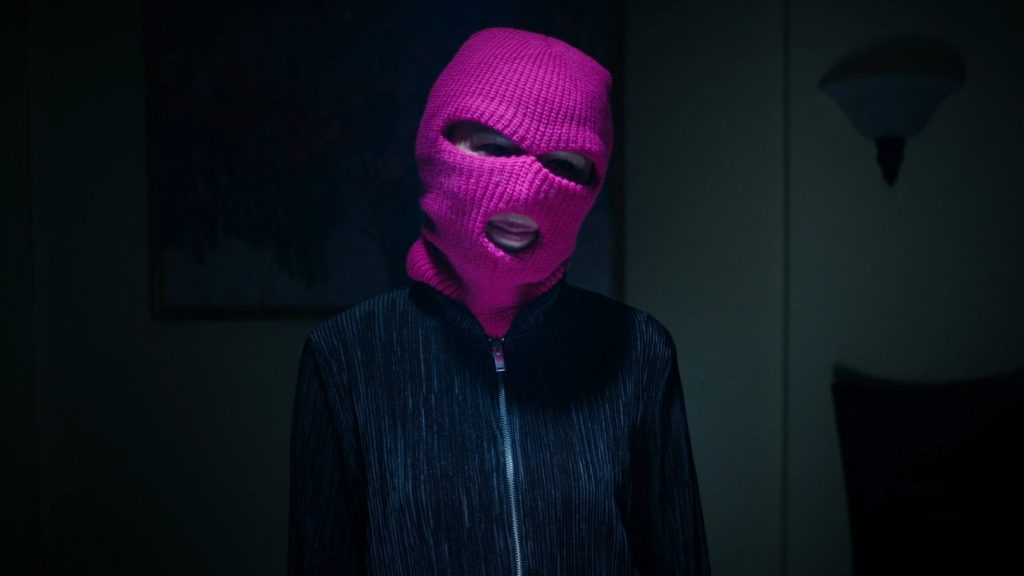I was done with MTV.
MTV has developed a reputation of putting together interesting shows from fresh voices, only to have no idea what to do with them. Teen Wolf (ending this year) has been a big hit for them, but that seems to be the exception; Awkward was an uproariously funny teen comedy with a strong female voice at the helm, poised to make a possible star out of Ashley Rickards. Then creator Lauren Iungerich left after season 2 due to creative differences, the network brought in two men to replace her, and it quickly turned bland. Their attempt at a Scream adaptation also fired its two female executive producers after the first season (demoting one to “consultant”), replaced them with men, and those men are now fired and the third season will be an anthology, with the Halloween special wrapping up the events of season 2. My heart has been broken so many times by MTV’s apparent incompetence; what made me want to risk it again with Sweet/Vicious, a dark action-comedy created by newcomer Jennifer Kaytin Robinson?
Joseph Kahn has been in the music video game for over two decades; the scope of this mad genius’s resume dates back to The Wu-Tang Clan and runs all the way up to Taylor Swift. Somewhere in between, he also made two feature films, each of which could probably warrant their own books, never mind essays. For the sake of brevity, just watch his take on Mighty Morphin’ Power Rangers, which somehow dismantles dark, gritty reboots of childhood favorites by excessively celebrating them. Once you do, you can probably understand how insane and beautiful it is that any executive—even one at hip, music video director-friendly MTV—took a look at the female-driven vigilante script they were developing and said, “We need that guy to direct the pilot.” Bottom line, anything Kahn is attached to, down to the meatball sub he had for lunch, demands your attention, and so Sweet/Vicious had mine.
Kahn has no involvement with the show past episode 2. However, his casually flashy tongue-in-cheek style makes him an inspired choice to set the tone for Robinson’s rousing, yet subversive and surprisingly heavy, series.
MTV was kind enough to make the opening act of the first episode available on YouTube. In it, we see frat boy Will get attacked at knife-point by a woman in a ninja outfit, accusing him of raping another girl on campus. There’s a gleeful and righteously dark sense of play to this scene, with the ninja threatening Will in ways that bluntly call attention to the way people like him take power from their victims. Holding the knife to his crotch, the ninja asks “Do I have consent?” When Will starts begging for his life/balls—”No, please don’t…”—she backhands him, and then apologizes: “I thought ‘no’ meant ‘yes.'” The ninja leaves the guy alive with the knife stuck in his leg and hightails it out. Once she’s clear, she reveals herself to be demure sorority girl Jules (Eliza Bennett); we’ll eventually learn that she is also a rape victim, trying to find her way to rape survivor.
Next, we meet Ophelia (Taylor Dearden), a sarcastic, green-haired counterpoint to Jules. Ophelia sells weed, regularly smokes it, and knows how to hack anything digital. (Of course, what Ophelia does is a bit closer to magic than actual hacking, which is fine for the purposes of this show.) When we meet her, she’s appreciating the package on the random guy passed out in her bed. She’s awesome, in that same way Ferris Bueller was awesome; she can engage the world in that smartass, competent, yet still charmingly awkward way most of us wish we could.
Ophelia meets Ninja Jules after taking a wrong turn down an alley while running from campus police, only to find her laying waste to someone who she knows raped one of her dormmates. In short time, Ophelia figures out Jules’s identity, and even after Jules warns her to let it go, her curiosity leads her to Jules’s next target: baseball player Carter Fisher. Ophelia is there when Jules gets overpowered by the bastard, which leads her to intervene.
Now, up to this point, it’s easy to assume that Robinson is setting the stage for a contemporary femmesploitation piece; a sort of Sweet Sweetback’s Badasssss Song for the far-too-many young women that have been victimized by entitled men. God bless it, Sweet/Vicious is more than happy to play to that. However, this is the moment where Robinson shows that she’s got even more interesting cards up her sleeve: In this show, beating up shitheel rapists is all fun and games until one of them gets bodied by a steel wrench to the skull.
When the dust settles, Jules’s fiery, vengeful demeanor gives way to horror and guilt; Ophelia’s coolly sarcastic attitude shatters into shock and panic. Instead of the rookie freaking out and the veteran insisting it was life or death, the show opts for the path where both girls realize they’ve crossed a line they never wanted to cross, and it’s as emotionally brutal as it is darkly hilarious. There’s a great scene where Jules and Ophelia, driving with Carter’s body in the trunk, start blasting music in a last-ditch effort to calm down, and they end up belting out “Defying Gravity” from Wicked. It’s this sweet, girly bonding moment, brilliantly juxtaposed against the brutal circumstances behind their sudden partnership. And the opening line of the song proper? “Something has changed within me…”
That song signals an important part of what Sweet/Vicious is doing. The show eventually slips into an episodic scumbag-of-the-week structure, but instead of merely leaving it at “vigilantes good, rapists bad,” Robinson’s writing appears cognizant of the fact that the events of her story are largely triggered by a traumatic change within Jules. As I mentioned before, Jules has been raped; such events in fiction tend to form the base of a classic setup that many feminist-minded media consumers have been decrying as an offensively simplistic portrayal of rape trauma. For all its visceral thrills, however, Sweet/Vicious isn’t interested in anything as simple as “IF ‘raped,’ THEN ‘strong.'” It’s interesting, for instance, that Jules has yet to don the ninja outfit to confront her own rapist. It may not be as interesting that she’s only told a few people about what happened to her, but it’s downright fascinating that those people don’t include her best friend Kennedy (Aisha Dee)—who happens to be dating Nate (Dylan McTee), the piece of shit who raped Jules.
So why wouldn’t Nate be the first name on Jules’s list? Why wouldn’t she at least warn Kennedy to run for the hills? Nobody’s stated an answer out loud yet, but it’s written all over Jules’s face whenever she’s in the same room as Nate; the color drains from her skin, and her body seems to lock up and shrink a few inches. It’s all indicative of what any rape survivor with the courage to speak up has been trying to tell people for years: Facing the person who victimized you in that way, even with so much on the line, can seem impossible. Sweet/Vicious takes it a step further and suggests that it can be easier to take your anger out on other people, particularly those you feel deserve it, than it is to face that person.
And yet, nothing about what Jules is doing seems to bring her any closer to an answer for the Nate problem. If anything, she’s pushing it away through the instant gratification she gets from taking down other rapists. Moreover, Jules’s vigilante gig cleverly compounds some of the usual issues rape victims tend to run into when they don’t have a healthy outlet for their distress: her grades are dropping, she’s shirking her responsibilities to her sorority chapter and emotionally retreating from her friends, particularly Kennedy. It’s even affecting her potential romance with cute, decent Tyler (Nick Fink); in addition to the understandable intimacy issues, Tyler happens to be Carter Fisher’s stepbrother.
Robinson and her team of writers eventually touch on some of the other drawbacks to Jules and Ophelia’s taking justice into their own hands. (There’s a great scene in the fifth episode with one of Carter’s victims that has powerful implications.) At the same time, though, they’re sketching out a setting with a clear epidemic of individuals who, for whatever reason—caught up in a certain identity, seeing themselves as genetically superior, whatever—keep hurting women, and the institutions that are supposed to protect those women won’t do anything about it; either their hands are tied, or they just don’t care. It’s gotten to the point where these women are writing down the names of their rapists on a bathroom wall because they feel like they have no other way of speaking up. If you’re capable of making these sons of bitches pay in any way, even one that may not necessarily be legal or even mentally healthy, then how do you walk away from that? Like any good vigilante story, one injustice keeps feeding the other. It’s just that Robinson, with all of zero other “Written by” credits on her IMDb, understands that in great vigilante stories, there are injustices on both sides.
To be sure, the show is far from dour. So far, even at its darkest and angriest, things unfold in a refreshingly breezy way. The show is rousing, and even fun, without ever marginalizing its traumatic subject matter. But it can switch tones at the drop of a hat with an unnerving, powerful smoothness, and those dramatic moments connect all the better for having caught you off guard.
When the show settles into its episodic groove—with the unraveling of the Carter Fisher cover-up and the emotional fallout of Jules’s rape taking up season-long arcs—the stories it has to tell are never boring, mixing things up and creating believable challenges for Jules and Ophelia. The third episode quickly pits Ophelia against someone whose computer wizardry might rival her own, but the very next one sees Jules and Ophelia take on a sorority with cruel and unusual hazing rituals. These episodes do a great job of mining their short-form stories for longer-term character material, addressing the ways Jules tries (and occasionally fails) to pull herself together while continuing to knock down Ophelia’s preciously cool facade to reveal the insecure and somewhat selfish woman underneath. Eliza Bennett and Taylor Dearden handle this comic and dramatic material with nimble grace. However, Bennett gets special props for making her badass masked avenger just as believable as her fragile, wounded victim. Meanwhile, Dearden—daughter of Bryan Cranston—appears to have inherited her father’s formidable comic chops while clearly setting herself apart from him.
Sweet/Vicious is the product of a fresh, talented writer taking on a timely subject that’s perfectly suited to the young viewers its network is aiming for, helped along by two ace lead performances and a pilot director that was totally dialed in to the unique tone said writer was going for. And it isn’t just “great for MTV;” it’s great, period. Even Alan Sepinwall, one of the most widely read TV critics on the internet, crawled out from under the deluge of screeners professionals like him get in order to single this thing out. While he’s a little less hot on it than I am, that is still a huge goddamn deal, and that should be as clear a signal as any that this show can firm up a strong identity for the network’s scripted slate. All MTV has to do, for once, is make the most of this opportunity.
Or at the very least, not hire a couple of men to replace the talented female creator of the show about women vigilantes beating up rapists.
Sweet/Vicious returns Tuesday, January 3rd at 10 PM ET on MTV. You can catch up through MTV.com or on the MTV app, or you can just buy the episodes off of Amazon Video.

